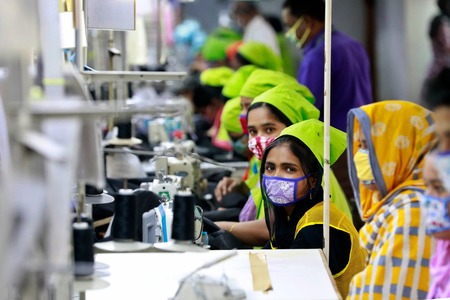

Garment Workers
The discussion about increasing the minimum wage to a level that can support a decent living has become highly contentious in Bangladesh. Many garment workers in Bangladesh, along with various labor unions, are proposing a monthly wage of 208 US dollars, which is approximately 23,000 taka.
Bangladesh is known for producing ready-made garments (RMGs) at a very low cost. The workers who make these clothes earn a minimum wage of only 75 US dollars per month, which is around 8,300 Bangladeshi taka. This is one of the lowest wages among countries that manufacture RMGs.
Thousands of garment workers clashed with the police in areas like Gazipur near the capital, Dhaka. They were demanding better wages and the right to join the demonstrations. To disperse the crowds, the police used tear gas and sound grenades.
Amid the protests, a factory called AMB Fashions in Konabari, which is part of the Bangladesh Garment Manufacturers and Exporters Association (BGMEA), was set on fire by the protesters. One worker from AMB Fashions died due to suffocation when the fire spread to the first three floors of the factory. Additionally, a maintenance machinist named Md Rasel Hawlader, who worked at Design Express Ltd., was shot and killed by the Bangladeshi police. Rasel was not part of the protest but became a victim of the clashes between workers and the police.
Workers were protesting for a basic minimum wage of 23,000 taka outside the factory. They had been demonstrating for several days across various RMG factories. The tragic incident involving Rasel Hawlader occurred when he tried to shut down equipment inside the factory.
Bangladesh is the second-largest exporter of RMGs after China. The RMG sector employs over 4.4 million workers, with 70 percent of them being women. This sector contributes significantly to the country’s economy, accounting for more than 80 percent of its total export earnings and over 11 percent of the national GDP.
Acegreen Eco-Material Technology has announced a five-year commitment to purchase recycled pulp and polyester from U.S.-based innovator Circ.
Archroma is set to showcase its latest innovations at China Interdye 2025 with a focus on durability, color longevity, and…
Innovative materials meet fashion-forward design at NEXT@Fashion InStyle, a trade show organized by the Hong Kong Trade Development Council (HKTDC).
Panda Biotech has partnered with TDMI Twin Dragon to unveil a groundbreaking hemp denim collection crafted from 100% American-grown industrial…
Serge Ferrari Group has unveiled Batyline (Stam) Skin Feel, a new addition to its acclaimed upholstery collection designed for both…
Soorty, a Pakistani denim manufacturer, has announced that its Soorty Organic Cotton Initiative is now officially recognised by the Organic…